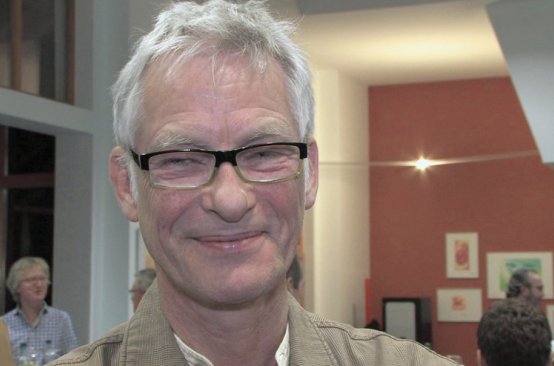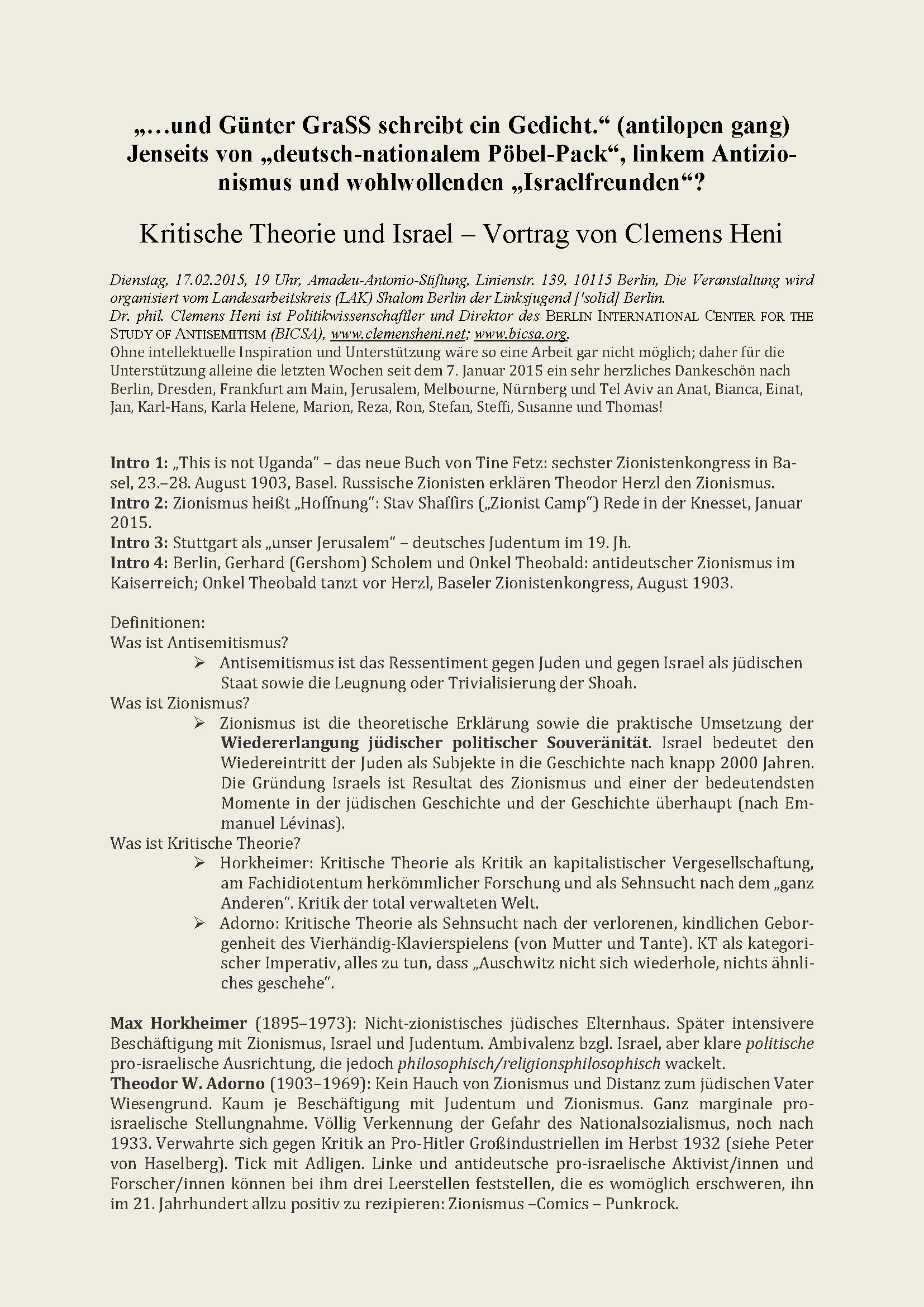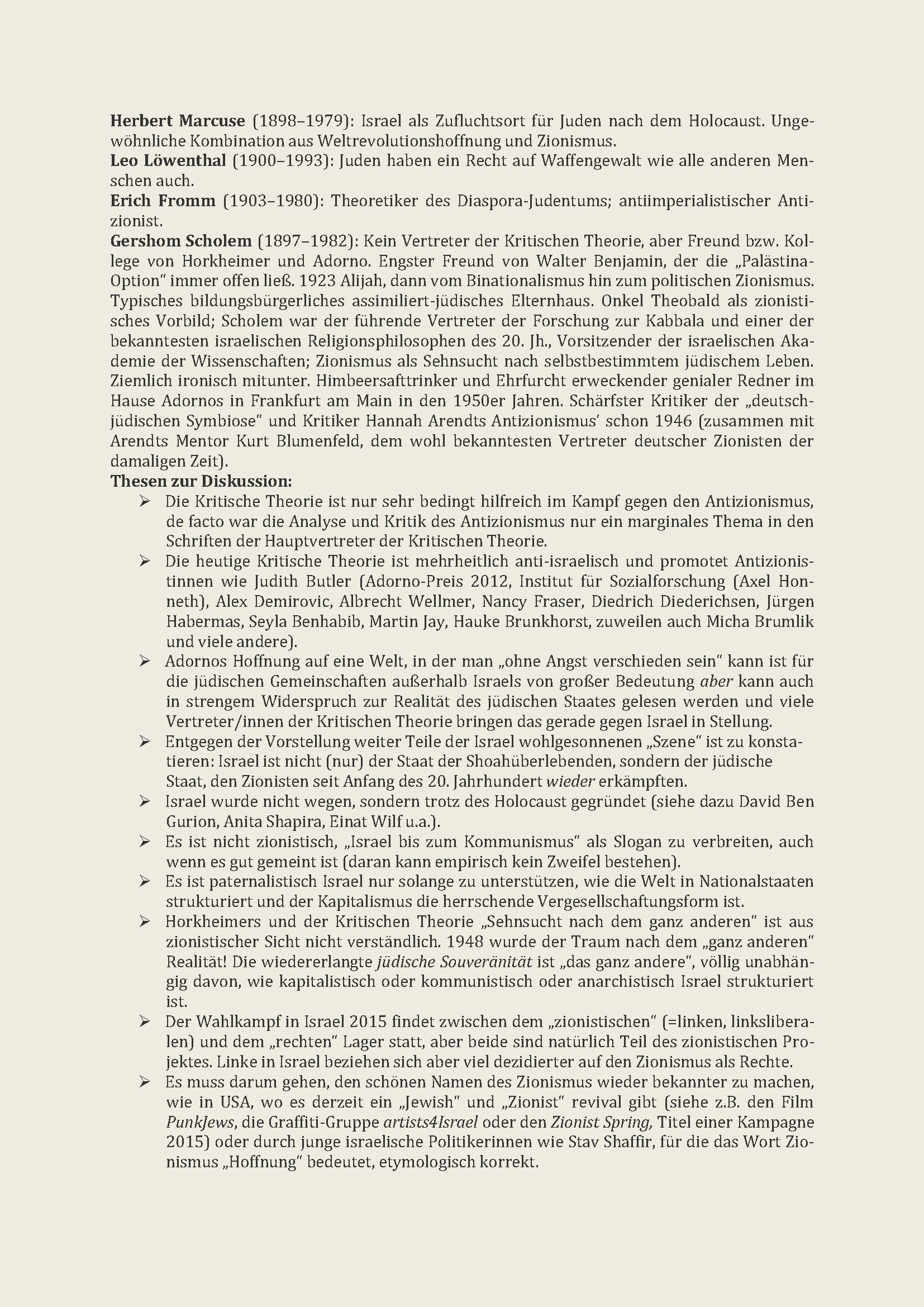Robert S. Wistrich war der weltweit bekannteste und renommierteste Antisemitismusforscher unserer Zeit. Er war einer der berühmtesten israelischen Forscher in den Geisteswissenschaften überhaupt. Der am 7. April 1945 in Kasachstan als Sohn polnisch-jüdischer Eltern geborene Historiker war „Neuburger Professor“ für „moderne europäische und jüdische Geschichte“ an der Hebräischen Universität Jerusalem und seit 2002 Direktor des dort 1982 gegründeten Vidal Sassoon International Center for the Study of Antisemitism (SICSA), das sich seither einen Ruf als einzigartige Forschungsstätte erworben hat. Robert Solomon Wistrich starb am 19. Mai 2015 während einer Vortragreise in Rom an einem Herzinfarkt.
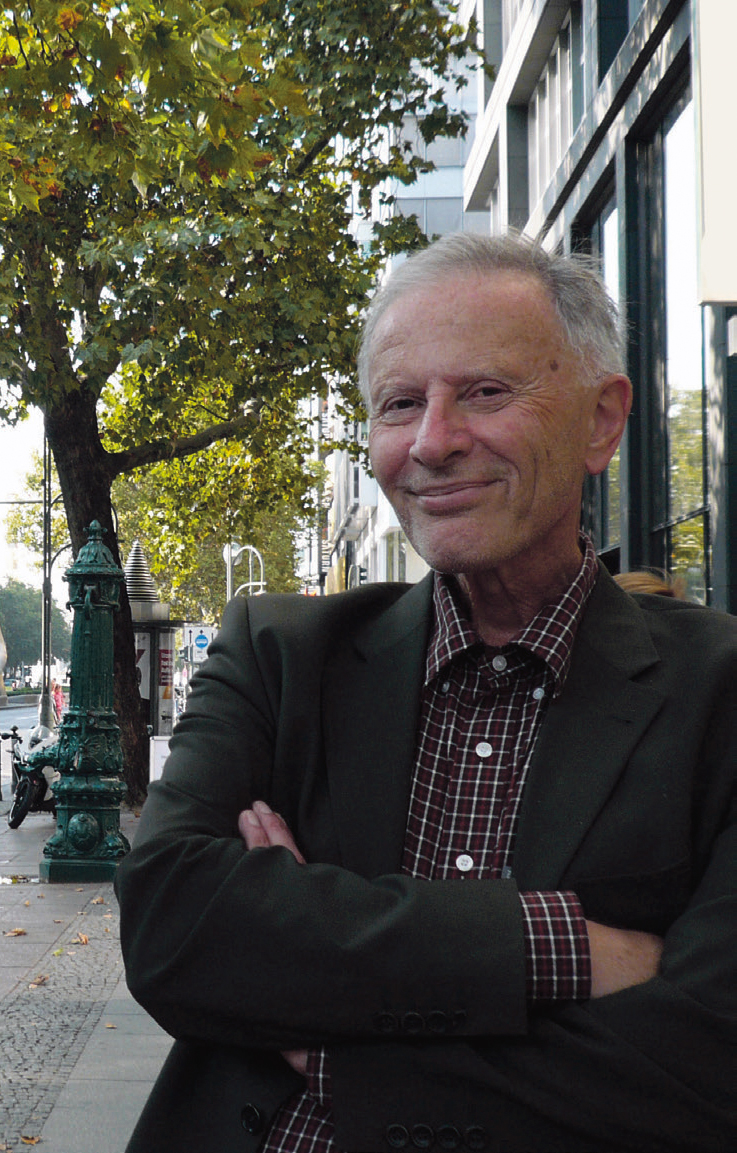
Prof. Dr. Robert Solomon Wistrich, Berlin, 16. September 2014
Sein Tod trifft seine Familie und Freunde, aber auch die weltweite Community von Zionisten und kritischen Antisemitismusforscherinnen- und forschern wie ein unfassbares Beben. Ein Schock.
Dabei mag es rückblickend wie ein Wunder wirken, dass Wistrich 70 Jahre alt wurde, wie sein Sohn auf der Beerdigung am 21. Mai 2015 in Jerusalem sagte – denn im Alter von 27 wurde bei Wistrich eine Krebsart diagnostiziert, bei der die Überlebenschancen laut Enzyclopaedia Britannica bei 2% liegen.
Robert wirkte am 14. Mai 2015, dem Tag, als wir uns das letzte Mal sahen, zuerst müde. Doch selbst in solchen Momenten vermochte er es wie kein zweiter public intellectual zu brillieren. Er sprach auf dem Global Forum for Combating Antisemitism, der weltgrößten Konferenz gegen Antisemitismus, zum Lunch. Vor ihm hatte Dan Shapiro, ein junger aufstrebender Diplomat, Botschafter der USA in Israel, eine Rede gehalten. Dessen Lobeshymnen auf Obamas Kampf gegen Antisemitismus ließ Wistrich nicht unkommentiert. Er begann gerade in diesem Rahmen seine Rede mit einer „ganz typischen jüdischen Frage“: „Wenn alles so wunderbar ist, warum ist es dann so schlimm?“ Seine letzte große Rede, vor 600 Gästen im Jerusalem Convention Center, war der intellektuelle Höhepunkt des Global Forums.
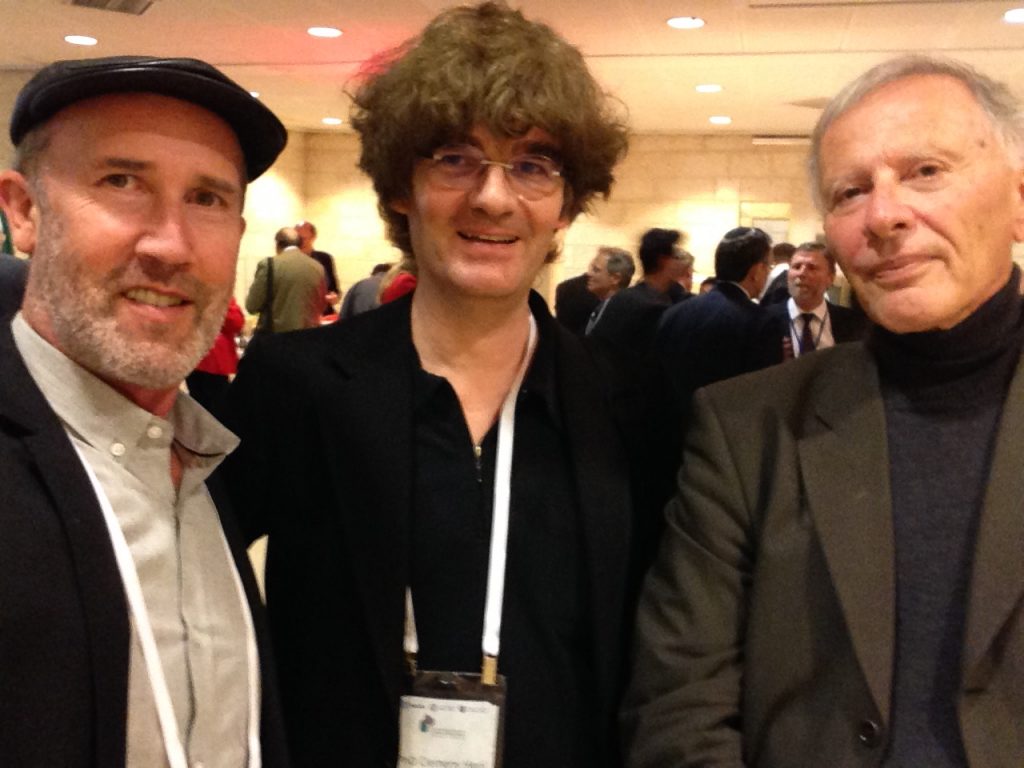
Robert Wistrich, Clemens Heni, Perry Trotter, Jerusalem, 14. Mai 2015, Global Forum for Combating Antisemitism
Später ging Robert noch in eine der working groups (über Holocaust-Trivialisierung), und wir sprachen noch sehr lange und waren bei den Allerletzten, die das Global Forum verließen. Er erzählte mir, dass er seine Nachfolge als Direktor des Vidal Sassoon International Center for the Study of Antisemitism (SICSA) ab Oktober 2015 regeln müsste. Merkwürdigerweise legte ihm die Hebräische Universität eine Liste mit Namen vor, darunter ausschließlich eigene Dozenten. Schließlich sagte mir Robert mit einem gewissen Schulterzucken sinngemäß, er habe schließlich die womöglich am wenigsten problematische Person gewählt…
Der Tod von Robert S. Wistrich besiegelt das Ende des Vidal Sassoon International Center for the Study of Antisemitism (SICSA), auch wenn das Zentrum formal erstmal weiterexistieren wird. Doch als führender zionistischer Intellektuelle, als der bedeutendste Antisemitismusforscher und als Historiker jüdischer Geschichte ist er nicht zu ersetzen. SICSA war Robert Wistrich und vice versa.
Er meinte, vielleicht würden wir uns ja am Sonntag am Ben Gurion International Airport treffen, da er nach Rom und wir zurück nach Berlin fliegen würden. So kam es, dass ich am Mittwochmorgen von Anat Varon, Roberts letzter Doktorandin, eine E-Mail bekam mit der schrecklichen Nachricht. Es gab vielfach Anzeichen für seinen wirklich schlechten Gesundheitszustand, doch Vorsicht, Zurückhaltung oder die Sorge um sich selbst waren ihm offenbar unbekannt. Anat zeigte mir Roberts Lieblingsplätze an der Hebräischen Universität, seinen quasi kaum bekannten zweiten Arbeitsraum (neben jenem bei SICSA) und sie erzählte wie genussvoll er bei Gesprächen über ihre Dissertation zu Franz Werfel, Österreich und jüdische Geschichte, Schokolade aß, die sie immer mitbrachte.

Prof. Dr. Robert S. Wistrichs Arbeitszimmer an der Hebräischen Universität Jerusalem
In seiner Rede auf dem Global Forum spannte Robert den Bogen vom Kampf gegen den Antisemitismus hin zum jüdischen „Empowerment“, zum aktiven Eintreten für Israel als das Land der Juden, wie es in einer bahnbrechenden Ausstellung des Simon Wiesenthal Centers, die Wistrich erarbeitet hat und die – nachdem Proteste arabischer Staaten, sie könne den „Friedensprozess“ gefährden, für eine Verschiebung ihrer Eröffnung und Umbenennung gesorgt hatten – selbst bei der UNESCO in Paris und dem UN-Hauptquartier in New York gezeigt wurde, so phänomenal deutlich wird: „People, Book, Land: The 3500 Year Relationship of the Jewish People with the Holy Land“.
Robert Wistrich war es, der mich im Dezember 2002 zu meiner ersten Israelreise einlud, mitten in der zweiten Intifada. Mein Vortrag auf seiner ersten großen Konferenz als Leiter von SICSA – über Medien, Antizionismus und politische Kultur in der Bundesrepublik – verursachte eine tomatenroten Kopf des Kulturattachés der Deutschen Botschaft in Israel, die meine Reise mitfinanziert hatte, und eine offizielle Beschwerde der Deutschen Botschaft beim Präsidenten der Hebräischen Universität Jerusalem über meine Person (und über meinen Kollegen Martin Ulmer von der Universität Tübingen). Die Botschaft forderte die Hebräische Universität auf, das Zentrum nicht weiter (oder weniger stark) zu unterstützen. Zu diesem Zeitpunkt war Robert Wistrich noch keineswegs als Leiter von SICSA etabliert, wenngleich als Antisemitismusforscher schon längst eine Berühmtheit.
Es war eine Ehre als frisch gebackener Promotionsstipendiat der Hans Böckler Stiftung (HBS) von offizieller Seite so wahrgenommen zu werden. Konsequenz: der Präsident der Hebräischen Universität befand unsere Vorträge als wissenschaftlich einwandfrei, es gab seither keinerlei Kontakt mehr zwischen SICSA und der Deutschen Botschaft. Ich bekam 2003 und 2004 ein Felix Posen Fellowship von SICSA. Robert selbst erwähnte diesen Konflikt mit der Deutschen Botschaft bei unserem Besuch am 12. Mai 2015 bei SICSA.
Wistrichs Bezeichnung des Antisemitismus als „der längste Hass“, wie sein gleichnamiges Buch und eine daran angelehnte dreiteilige Fernsehserie 1991 hießen – Antisemitism: The Longest hatred –, ist so prägnant wie mittlerweile international etabliert.
1985 beschrieb Wistrich in seinem Buch Hitler’s Apocalypse (auf Deutsch 1987: Der antisemitische Wahn: Von Hitler bis zum Heiligen Krieg gegen Israel), wie er bereits zehn Jahre zuvor in England eine neue Form des Antisemitismus bemerkt hatte: den antizionistischen Antisemitismus, der heute ein wesentlicher Teil dessen ist, was man „neuer Antisemitismus“ nennt. Dieser ging zunächst vor allem von Linken, häufig gut ausgebildeten Leuten an Universitäten aus.
Was damals noch am Rande der Gesellschaft sich zutrug, ist längst Mainstream. Der islamische Antisemitismus benötigt den Antisemitismus der Linken und des Mainstreams in westlichen Ländern dringend. Ohne wohlwollende, abwiegelnde Linke, Liberale und naive Multikulturalisten, die das Thema muslimischer Antisemitismus aus den Universitäten zu verbannen suchen, hätten die Islamisten kein so leichtes Spiel.
Robert S. Wistrichs wissenschaftliche Karriere begann an der berühmten Wiener Library in London in den 1970er-Jahren, nachdem er Ende der 1960er-Jahre unter anderem im kalifornischen Stanford studiert hatte. 1982 erhielt Wistrich eine Professur an der Hebräischen Universität in Jerusalem, der Hauptstadt Israels. Man kann seine Forschungen in fünf Kategorien einteilen, wobei im Folgenden nur seine Bücher aufgeführt werden. Hinzu kommen etliche von ihm herausgegebene Bände, Hunderte Artikel, Einführungen zu Bänden, Broschüren und andere Texte, die fast alle ebenfalls in diese Kategorien fallen:
1) Die Linke und Antisemitismus. Hierzu zählen folgende Monografien: Revolutionary Jews from Marx to Trotsky (1976); Trotsky: Fate of a Revolutionary (1979); Socialism and the Jews: The Dilemmas of Assimilation in Germany and Austria-Hungary (1982); From Ambivalence to Betrayal. The Left, the Jews and Israel (2012).
2) Die Geschichte der Juden mit einem Schwerpunkt auf dem deutschsprachigen Judentum in Europa von der Mitte des 19. Jahrhunderts bis 1933. Hierzu zählen seine 700 Seiten starke, mehrfach preisgekrönte Arbeit The Jews of Vienna in the Age of Franz Joseph, 1987 abgeschlossen, 1989 auf Englisch publiziert (1999 auf Deutsch Die Juden Wiens im Zeitalter Kaiser Franz Josephs); Between Redemption and Perdition. Antisemitism and Jewish Identity (1990); Austrians and the Jews in the Twentieth Century: From Franz Joseph to Waldheim (1992); Austrian Legacies: Jews and National Identity (2004); Ma’abada le-heres ha-olam. Germanim ve-yehudim be mercaz-europa (2006); Laboratory for World Destruction. Germans and Jews in Central Europe (2007).
3) Hitler, der Nationalsozialismus und der Holocaust. Who is Who in Nazi Germany (1982; 1983 und in weiteren Auflagen auf Deutsch unter dem Titel Wer war wer im Dritten Reich?); Hitler’s Apocalypse: Jews and the Nazi Legacy (1985; auf Deutsch 1987 Der antisemitische Wahn: von Hitler bis zum Heiligen Krieg gegen Israel); Weekend in Munich: Art, Propaganda and Terror in the Third Reich (1995; auf Deutsch 1996 Ein Wochenende in München: Kunst, Propaganda und Terror im Dritten Reich); Hitler and the Holocaust“ (2001; auf Deutsch 2003 Hitler und der Holocaust).
4) Theorien und Analysen des Antisemitismus und Antizionismus. Antisemitism: The Longest Hatred (1991); ebenso in Hitler and the Holocaust und in A Lethal Obsession. Anti-Semitism from Antiquity to the Global Jihad (2010).
5) Muslimischer Antisemitismus. Diesen betrachtete Wistrich zunächst in Hitler’s Apocalypse (siehe [3]), sodann in der Broschüre Muslim Antisemitism. A Clear and Present Danger (2002,) sowie in weiten Teilen von A Lethal Obsession (2010), das neben (4) und (5) auch die anderen analytischen Kategorien behandelt.
Wer Wistrichs Bücher, Artikel und Broschüren liest, Interviews von ihm hörte, mit ihm diskutierte oder seine Vorträge live erlebte, bemerkte sofort: Inmitten einer geschwätzigen, sich am liebsten selbst bespiegelnden und innerhalb der eigenen Schulrichtung untereinander sich zitierenden Forscherwelt sprach hier jemand, der etwas zu sagen hat, der seine Analysen öffentlich diskutiert wissen wollte und sich nicht im Elfenbeinturm versteckte. Seine Bücher haben eine Geschichte.
Wistrich forschte und publizierte nicht, um eine lange Publikationsliste vorweisen zu können, wie es heute nicht selten mit Indifferenz zum Sujet der Fall ist. Seine Vorworte zu vielen seiner Studien zeugen von einer persönlichen Beziehung zu der jeweiligen Forschung. Sein Werk über die Juden Wiens im Zeitalter Kaiser Franz Josephs, die Geschichte der Juden im Habsburgerreich (dem ältesten europäischen Herrschaftsverbund, der von Ende des 13. Jh. bis 1918 währte), hat viel mit seiner Herkunft zu tun. Er widmete das Buch seinen vier Großeltern (Salomon und Anna Wistreich sowie Simon und Helena Silbinger), die Bürger von Krakau waren, das damals zur österreichisch-ungarischen Monarchie gehörte. Bereits 1969/70 fing er an, sich als Student an der Hebräischen Universität Jerusalem Wien und dem Fin de Siècle zu widmen – ein Projekt, das knapp 20 Jahre später in die genannte Studie mündete. Viel machte Wistrich an Personen fest, etwa an Sigmund Freud oder Arthur Schnitzler, Karl Kraus oder dem Rabbiner, Politiker und Autor Joseph Bloch.
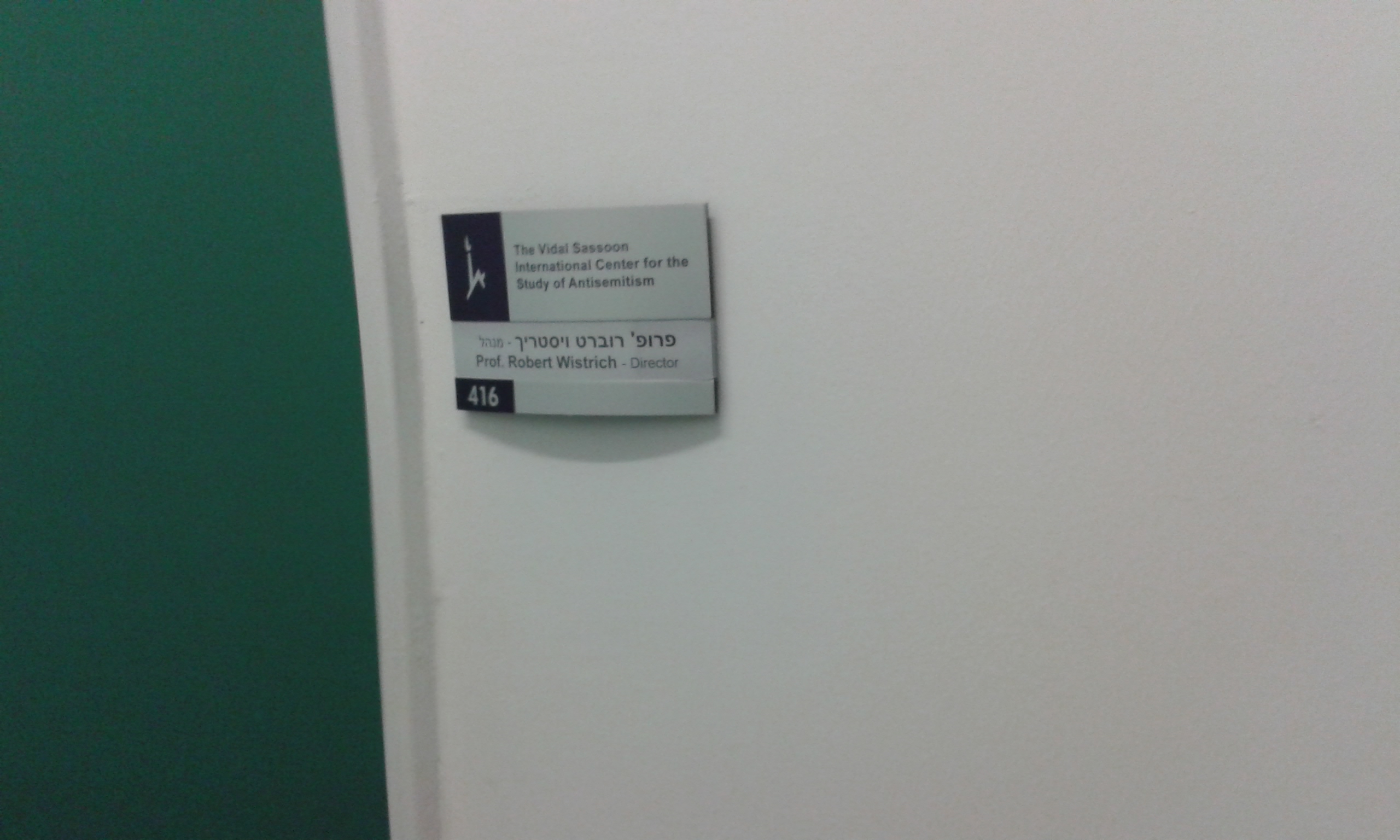
Prof. Dr. Robert S. Wistrichs Zimmer als Direktor des Vidal Sassoon International Center for the Study of Antisemitism (SICSA)
Friedrich Nietzsche war für viele Zionisten um 1900 Inspiration für einen jüdischen Aufbruch, eine lebensfreudige, ästhetische, kraftvolle Kritik am herrschenden geistigen Stillstand des christlichen Europa mit seinem immer stärker werdenden Antisemitismus, gerade in Österreich-Ungarn und Deutschland, aber auch in Frankreich. Nietzsche war eine Provokation für Deutschtümler, Christen und Antisemiten. Wistrich zeigte, wie Nietzsche gegen den Antisemitismus im 19. Jahrhundert kämpfte und sich von seiner Schwester und von Richard Wagner geradezu angewidert abwandte. Ebenso analysierte Wistrich in Laboratory for World Destruction, wie manche Texte oder Phrasen Nietzsches wie der „Übermensch“ von Rechten und dem Nationalsozialismus in deren völkische Richtung uminterpretiert werden konnten, was gleichwohl einer kompletten Verkehrung gleichkam. Tatsächlich hatte Nietzsche eher einen jüdischen „Supermann“ (so Wistrich) und vor allem eine „Entdeutschung“ im Blick als ein teutonisches Monster, was auch die Faszination der Zionisten und anderer Intellektueller, Außenseiter und Gesellschaftskritiker um 1900 und später erklärt. Wistrich geht auf die Analyse der Bibel aus der Feder des eher projüdischen Philosophen ein. Nietzsche machte sich über Christen lustig und feierte das Judentum, ohne ein plumper ‚Philosemit‘ zu sein – dafür waren sein Sarkasmus, seine Kritik und seine Umwertung der allzu deutschen Werte, die sich als Vorbild die Bosheit Heinrich Heines nahmen, viel zu stark, Leib gewordenes „Dynamit“. Nietzsche trennt in Die Genealogie der Moral zwischen Altem und Neuem Testament: „Das Alte Testament – ja, das ist ganz etwas anderes: alle Achtung vor dem Alten Testament! In ihm finde ich große Menschen, eine heroische Landschaft und etwas vom Allerseltensten auf Erden, die unvergleichliche Naivität des starken Herzens“.
Robert Solomon Wistrich war nicht nur ein Historiker europäischer Geschichte. Insbesondere die intellektuellen Entwicklungen seit dem 19. Jahrhundert, häufig an herausragenden Protagonisten festgemacht, waren wesentliches Element seiner Forschungen. Interessant ist, wie er Geschichte mit heutiger Politik politisch-philosophisch in Beziehung setzte beziehungsweise heutige Phänomene kontextualisierte; so z. B., wenn er in Lethal Obsession den iranischen Revolutionsführer Ayatollah Khomeini und das iranische Prinzip des wali al-faqih, das dem oberster Herrscher die Exekutive, Judikative und die Legislative unterordnet, erwähnte und dieses Prinzip zu einer „dynamischen, schiitischen Version des platonischen Philosophenkönigs“ erklärte.
Wisstrich kannte sich in den Werken von Franz Mehring, Karl Marx, Karl Kautsky, Rosa Luxemburg, Theodor Herzl und Victor Adler so gut aus wie in der gegenwärtigen islamistischen Literatur und Publizistik aus Iran, Ägypten, den Golfstaaten, Syrien und dem Irak sowie der Palästinensischen Autonomiebehörde. Er war ein Aufklärer und weiß doch um die Dialektik der Aufklärung. Voltaire war nicht nur eine wichtige Figur der Aufklärung im 18. Jahrhundert, er war auch ein „rabiater Judenfeind“ mit großer Ausstrahlung nicht nur auf den französischen Antisemitismus (z. B. den Anarchisten Pierre-Joseph Proudhon). Wistrich wusste um die Bedeutung von Bildung in der heutigen Zeit, doch ebenso war ihm vor dem Hintergrund der Geschichte des westlichen Antisemitismus und des Anteils der Gebildeten und Eliten daran seit dem Mittelalter bis in unsere modernen und postmodernen Zeiten bewusst: „Es ist nicht genug“, wie er 2009 auf einem Vortrag in Kanada sagte. Wer sich die Forschungstendenzen an Universitäten anschaut und sieht, dass gerade von den vorgeblich gebildetsten Kreisen Antisemitismus und Islamismus trivialisiert, vernebelt, wenn nicht massiv gefördert werden, merkt, wie naiv bloße Appelle wie „mehr Bildung für alle“ oder „Migranten in Deutschland brauchen mehr Bildung“ sein können.
Wistrich promovierte mit der oben genannten Arbeit Socialism and the Jews – eine über 700 Druckseiten dicke Arbeit, die auf der „Shiva“, der siebentägigen Trauerzeit im Hause des Verstorbenen, gemeinsam mit allen anderen Werken aus seiner Feder gezeigt wurde, was wie ein roter Faden in seinem Leben ist: die Geschichte der Linken und die der Juden.
Sein Vater, Jacob Wistreich, war kurzzeitig Mitglied der linken zionistischen Gruppe Hashomer Hatzair, wurde aber bald darauf durch eine Zwangsumsiedlung unter Stalin 1940 seiner Träume von einem „sozialistischen Paradies“ beraubt, wie Wistrich schreibt. Doch viel wichtiger: So überlebte der Vater den Holocaust; das Gleiche gilt für Sabina, Robert Wistrichs Mutter, der er mehrere seiner Bücher widmete. Fast die Hälfte seiner Familie hat Wistrich in der Shoah verloren.
Die Geschichte der Juden in Europa war für Robert S. Wistrich also sowohl biografisch als auch wissenschaftlich von herausragendem Interesse. Er wuchs in England auf, sprach aber zuerst Polnisch und Französisch, ebenso lernte er Englisch, Deutsch und Hebräisch; zudem konnte er Jiddisch, Russisch, Ukrainisch, Tschechisch, Italienisch, Spanisch, Lateinisch, Niederländisch und Arabisch.
Wistrich kannte eine ungeheure Anzahl von Dokumenten, gedruckten wie ungedruckten, und war in vielen wichtigen historischen Archiven von Paris bis New York, Jerusalem, Tel Aviv, Washington D. C., London, Rom und Wien unterwegs, um nur einige Orte zu nennen. Er hatte die Gabe, sich in die Details zu vertiefen und dabei das Ganze der Gesellschaft nicht aus den Augen zu verlieren und auf den Begriff zu bringen. So zitierte er zum Beispiel aus einem Brief des Wiener Komponisten Arnold Schönberg an den Maler Wassily Kandinsky vom April 1923, in dem der ansteigende Antisemitismus am Beispiel der „Bauhaus-Architektur-Schule“ in Deutschland thematisiert wird und Schönberg resigniert feststellt, dass er als Jude sich aus der Menschheit fast schon ausgeschlossen vorkommt, so aggressiv war schon seinerzeit das antisemitische Klima. Das bettete Wistrich in die Geschichte des Antisemitismus bis zum Holocaust ein, ausgehend vom Habsburger Reich, von Multiethnizität und Moderne hin zu Deutschtum, Nationalismus, Karl Lueger und Hitler.
2010 publizierte Wistrich im New Yorker Verlag Random House die derzeit umfangreichste und bedeutendste Monografie über die Geschichte und Gegenwart des Antisemitismus: A Lethal Obsession: Anti-Semitism from Antiquity to the Global Jihad (Eine tödliche Obsession: Antisemitismus von der Antike bis zum weltweiten Jihad). In diesem quellengesättigten, über 1.100 Seiten zählenden Werk stellt er in fünfundzwanzig Kapiteln umfassend die Geschichte des Antisemitismus dar – mit einem klaren Schwerpunkt auf dem zwanzigsten und vor allem einundzwanzigsten Jahrhundert. Es ist ein wissenschaftliches Standardwerk der Antisemitismusforschung und zugleich ein eminent politisches Buch, eine Einmischung, kein esoterisches Kleinklein für Oberstudienräte oder habilitierte Karrieristen.
Man sah es dem Verfasser durchaus schon an: Rollkragenpullover und Jackett sind nicht nur Insignien kritischer philosophischer Kreise der 1960er-Jahre und später. Wer wie Wistrich nicht selten öffentlich so auftrat, so auch bei seinem letzten großen Auftritt am 14. Mai 2015 in Jerusalem, gibt damit auch ein Statement ab. Man ist versucht zu sagen: Etikette ist etwas für „wannabees“, Intellektuelle haben das nicht nötig. Oder einfacher gesagt (mit Hegel im Hinterkopf): Inhalt schlägt Form. Der ruhige und sachliche, aber persönliche, engagierte Ton sowie seine historischen und philosophischen Anspielungen waren ungemein inspirierend. Wistrich betonte mitunter, wer ihn zu seinen vielfältigen Studien animiert hatte, zum Beispiel Simon Wiesenthal, der ihn Mitte der 1980er-Jahre bat, doch die Beziehung von Antizionismus und Antisemitismus zu untersuchen. Dieses Thema avancierte zu einem Schwerpunkt der Forschungen Wistrichs und mündete in die bereits erwähnte Analyse in Buchform und die TV-Serie Antisemitism: The Longest Hatred.
20 Jahre später, gleich zu Beginn des Buches Lethal Obsession, strich Wistrich heraus, dass der Antisemitismus seit dem Ende des Nationalsozialismus keine solche „Hochzeit“ („heyday“) mehr erlebt habe wie heute im Nahen Osten. Der Antisemitismus ist aus Deutschland in den Nahen Osten gewandert, ohne bloß exportiert worden zu sein. Wer bei Sinnen ist, kann weder die ungeheuerliche Quantität noch die gefährliche neue Qualität des muslimischen Antisemitismus ignorieren.
Wistrich war auch ein Kritiker mancher Erklärungen über den Holocaust (in seinem Buch Hitler and the Holocaust) und der These, die Moderne, Bevölkerungspolitik oder eine „Ökonomie der Endlösung“ und nicht ideologischer Hass und Antisemitismus seien für die Shoah verantwortlich gewesen. Hitler und der Nationalsozialismus insgesamt hatten eine „millenaristische, apokalyptische Ideologie der Vernichtung“, in deren Zentrum der „Antisemitismus“ stand, wie Wistrich hervorhebt. Wie bei seinen heutigen Analysen des islamischen Antisemitismus wendet sich der Historiker bei der Analyse des Holocaust gegen Rationalisierungen und ein Verstehenwollen von antisemitischer Agitation und Aktion, wo sich doch irrationaler Hass jenseits der Vernunft oder ökonomischer Logik befindet. Es gibt keine „Logik der Modernisierung“ in der Tatsache, dass die Deutschen 2.200 Juden von der griechischen Insel Rhodos nach Auschwitz deportierten, wie er schreibt.
Die herkömmliche Forschung ignoriert und derealisiert die internationalen Diskussionen über Antisemitismus in den letzten zehn Jahren. Sie will nichts von der Resignation der Juden in den Niederlanden wissen, von der der israelische Forscher und Holocaustüberlebende Manfred Gerstenfeld berichtet, wo viele Juden keine Zukunft mehr für sich in einem zunehmend von aggressiven Muslimen beziehungsweise Islamisten bestimmten Land sehen. Ähnlich sieht es in Schweden aus. Und Juden in Deutschland trauen sich kaum, offen mit Magen-David-Halskette durch die Straßen zu laufen, vor jeder Synagoge und jedem jüdischen Kindergarten stehen schwer bewaffnete Polizisten, um Juden vor antisemitischen Angriffen zu schützen. Ein Blick ins Internet zeigt einen teils unfassbar brutalen und vulgären Antisemitismus. Auch Robert Wistrich sprach in den letzten Jahren zunehmend pessimistischer über die Zukunft der Juden in Europa.
Die europäischen und deutschen Wirklichkeiten im virtuellen Raum, aber ebenso in Redaktionsstuben, auf den Straßen, in Forschungskolloquien, beim Einkaufen, auf Demonstrationen etc. sind vor allem seit dem Jahr 2000 und dann nach 9/11 von einem enormen Antisemitismus bestimmt. Die meisten Forscher wollen ihn nicht erkennen, weil er meistens nicht im Neonazi-Style daherkommt, sondern sich als „Israelkritik“ versteckt und aus der Mitte der Gesellschaft kommt. Der einstimmige Bundestagsbeschluss am 1. Juli 2010 bezüglich der sog. Gaza-Flottille ist ein Beleg für die zunehmende Israelfeindschaft selbst in einem Land, das sich als Freund des jüdischen Staates geriert. Und dann kam der antisemitische Sommer 2014 mit den brutalsten, massivsten und größten antijüdischen Aufmärschen in ganz Europa seit Jahrzehnten.
Im November 2011 erschien der erste „Antisemitismusbericht“ der Deutschen Bundesregierung („Antisemitismus in Deutschland. Erscheinungsformen, Bedingungen, Präventionsansätze“), verfasst von einem „unabhängigen Expertenkreis Antisemitismus“, der sich aus zehn teils erfahrenen Forschern zusammensetzte. Darin wurden nicht nur die deutsch-iranischen Beziehungen außen vor gelassen und eine Analyse und Kritik des Islamfaschismus (in seiner historischen wie gegenwärtigen Version) verweigert. Auch die meisten der international bedeutenden Forscher zu muslimischem Antisemitismus wurden bewusst ignoriert. Während manche (Antisemitismus-)Forscher mit englischen Texten durchaus rezipiert wurden, ignorierte der Bericht z.B. alle Bücher und Artikel von Robert S. Wistrich, obwohl seine Texte sogar auf Deutsch vorliegen. Solche Ignoranz entspräche einer Studie über Die Geschichte der Physik in den Jahren 1900 bis 1925, die Albert Einstein noch nicht einmal erwähnte.
Würden die meisten deutschen (Antisemitismus-)Forscher/innen die Diskussionen in den jüdischen Gemeinschaften, z. B. in Europa, Israel und den USA kennen, wären sie über die dortigen Ängste in den letzten zehn Jahren informiert und würden nicht Texte publizieren, die z. B. in Anlehnung an Umfrageerbnisse ernsthaft behaupten, 47 % der Linken seien zwar „antiisraelisch“, aber nur 3 % davon antisemitisch. Als ob die Ablehnung des jüdischen Staates Israel nicht einen Kern des heutigen Antisemitismus ausmachte. Wer gegen (einen jüdischen Staat) Israel ist, ist heutzutage natürlich ein Antisemit, da Israel der Staat der Juden ist.
Die Situation in Europa und Deutschland ist dramatisch und die Forschung versagt in weiten Teilen. Antisemitismus ist unschwer erkennbar, wenn man denn nur luzide untersucht und nicht nur auf der Oberfläche surft. Eine Analyse der Medien ist von großer Bedeutung.
Ein Witz, den Robert S. Wistrich bei der offiziellen Präsentation seines Meisterwerkes A Lethal Obsession am 5. Januar 2010 im Woodrow Wilson International Center for Scholars in Washington D. C. im Beisein des bekannten Historikers Jeffrey Herf erzählte, mag verdeutlichen, wie Antisemitismus heute in Europa häufig funktioniert. Der Witz geht so: Steht ein kleines Mädchen verlassen in der Flughafenhalle in Paris und wird von einem aggressiven Hund, einem Pitbull, attackiert. Reaktionsschnell erschießt ein zufällig vorbeikommender Mann den Hund und rettet das Mädchen. Natürlich kommen sofort viele Journalisten, machen Bilder, loben den Helden und sagen zu ihm: „Morgen werden wir in den Pariser Zeitungen mit der Schlagzeile ‚Pariser rettet Mädchen vor dem Angriff eines Hundes‘ aufmachen.“ Daraufhin der Mann: „Aber ich bin gar nicht aus Paris.“ „Okay, dann schreiben wir ‚Franzose rettet Mädchen vor dem Angriff eines Hundes‘.“ „Aber ich bin auch kein Franzose.“ „Na gut, dann schreiben wir ‚Europäer rettet Mädchen‘.“ „Aber ich bin auch kein Europäer. Ich komme aus Israel.“ Darauf dann die Journalisten unisono: „Ah, okay. Dann bringen wir morgen die Headline: ‚Israeli tötet den Hund eines Mädchens‘.“
Seit Mitte der 1980er-Jahre betonte Wistrich (wie in seinem Buch Hitler’s Apocalypse von 1985), dass der muslimische Antisemitismus eine große Gefahr ist. Dies ist empirisch nachvollziehbar und zeigt, dass in Israel und den USA dieser Sachverhalt schon weitaus früher erkannt wurde, während sich in Deutschland bis heute der allergrößte Teil der universitären Forschung und der Mainstream der Politik, des Journalismus und der politischen Aktivisten weigern, dies auch nur zu thematisieren. Wistrich war als Forscher und Stipendiat bereits in den frühen 1970er-Jahren in der Bundesrepublik und hat sich seitdem intensiv und kontinuierlich mit den Diskussionen um Antisemitismus in Deutschland beschäftigt. In Lethal Obsession bezog er sich sowohl auf die Kritik von Henryk M. Broder am linken Antizionismus in der Bundesrepublik der 1970er- und 1980er-Jahre als auch auf die Kritik am Islamismus, am Wegschauen, Duckmäusern und Plädieren für den unhinterfragten Dialog, die Broder in seinem Buch Hurra, wir kapitulieren (2006) formulierte.
Im Herbst 2014 fragte mich Robert, ob ich nicht eine Chance sehen würde, sein Buch „Der antisemitische Wahn“ von 1987 (das war die deutsche Ausgabe von „Hitler’s Apocalypse“) neu herauszugeben. Er sähe darin viele Aspekte des heutigen Antisemitismus antizipiert und wolle das Buch mit einem aktuellen Vorwort im Jahr 2015 publizieren. Natürlich sagte ich zu, das Buch herauszugeben. Bei dem oben erwähnten Treffen bei SICSA, exakt eine Woche vor seinem Tod in Rom, gab mir Robert einen Ausdruck seiner ganz frisch geschriebenen Einleitung zu diesem Band. Diese Einleitung ist ein Rückblick auf seine Forschung sowie die politischen Entwicklungen des Antisemitismus in den letzten 30 Jahren. Der Text wird im Sommer 2015 als Teil der Neuausgabe von „Der antisemitische Wahn“ in deutscher Sprache erscheinen. Robert S. Wistrichs Einleitung kann nun geradezu als eine Art wissenschaftliches und politisches Testament gelesen werden, da es einer der letzten längeren Texte ist, die er unmittelbar vor seinem Tod geschrieben hat und der ganz grundsätzlich zusammenfasst, was er unter Antisemitismusforschung verstand.
Es war immer eine solche Freude mit ihm – wem sonst? – über die merkwürdigen Forschungen vieler unserer Kolleg/innen zu sprechen. Seine Zustimmung wie Kritik war über viele Jahre hinweg Inspiration und von einer unbeschreiblichen Motivation geprägt. Er hatte viele Probleme mit der Mainstreamforschung, die dem Gerede oder esoterischen Kleinklein noch immer der Kritik und luziden Analyse Vorzug gab und gibt. Robert wusste das und spürte es schmerzlich. Er ließe sich mitunter auch zu Vorträgen einladen von Leuten, die er wissenschaftlich teils sehr problematisch empfand (oder zu empfinden lernte), wie er mir einmal sagte.
Der Kern seiner zahlreichen öffentlichen Auftritte ist folgender: Wie kein anderer verstand er es, wie zum Beispiel auf der großen Abschiedskonferenz als Professor der Hebräischen Universität im Frühsommer 2014 in Jerusalem, „to step back“, einen Schritt zurück zu gehen und sich das große Bild anzuschauen. Er hatte den Überblick und zeigte die großen Linien auf. Selten wurde das postmoderne Geschwätz vom Ende der großen Ideen und der Foucaultianismus so sehr der Unwahrheit geziehen wie in Reden und Texten von Robert Wistrich.
Wenn die Stadt Jerusalem „Body and Soul“ meint, wie ein Dokumentarfilm von Gloria Greenfield heißt, bei dem Robert Wistrich eine wichtige Rolle spielt, somit die städtische Verkörperung der Verbindung von Juden zum Land Israel, dann war Robert Wistrich die intellektuelle Verkörperung jüdischer Geschichte und des Zionismus.
Diese Geschichte des jüdischen „Empowerment“ ist es, die so zentral war für das Werk von Robert S. Wistrich. Die ruhige Art, in der er sprach, das Blicken, ob das Ungeheuerliche, das er analysierte, überhaupt als solches erkannt würde, war so faszinierend und mitreißend, ja intellektuell inspirierend. Robert wurde die letzten Jahre religiöser, wie seine Witwe Daniela in ihrer Rede erwähnte, was gleichwohl in Kontrast oder einem dialektischen Verhältnis stand zu seiner gleichsam jugendlichen Freude, mit uns im Herbst 2014 in Berlin eine ganz unkoschere Wurst mit Pommes zu essen und es im Sonnenlicht zu genießen. Seine Ironie war köstlich, auch wenn er sich auf Bildern als der fünfte Beatle hineinphotoshopte, wie man heute sagen würde.
Es war bewegend, wie Daniela mir auf der Shiva das Arbeitszimmer von Robert zeigte und auch private Fotografien aus seinem und zu weiten Teilen ihrem Leben.
Robert sprach immer wieder mal von sich als „Marathon-Man“, was Susanne Wein und ich nach fünf- oder sechsstündigen Gesprächen wie in Berlin oder New Haven (CT, USA) erleben konnten, er blühte nach stundenlangen Diskussionen noch mehr auf. Robert besaß ein sagenhaftes Erinnerungsvermögen, von Episoden aus dem Leben von Hannah Arendt – die er nicht wirklich schätzte – über den Zionisten Ben Halpern – der mal sein Nachbar war – reichte die Palette der Beziehungen.
Als Historiker des linken Umgangs mit Juden bzw. des linken Antisemitismus und der Geschichte der Juden in Europa kam Wistrich schon Mitte der 1980er Jahre zum Thema des Islamismus oder des antijüdischen und antiwestlichen Jihad. Die eminente Bedeutung seiner Analyse zumal des muslimischen Antisemitismus zeigt sich vor dem Hintergrund der üblichen Abwehrmaßnahmen innerhalb der Geschichtswissenschaft, Soziologie, Politologie, Islam- und Nahostforschung, Literaturwissenschaft, Amerikanistik und Arabistik, Irankunde und Antisemitismusforschung. Dort schwelgen viele Forscherinnen und Forscher lieber in postkolonialer und postorientalistischer Theorie und schüren antiwestliche Ressentiments, statt sich mit der Realität des mörderischen, weltweit agierenden Jihad und islamischen Antisemitismus zu befassen und Kritik zu üben.
In seiner deutschen Ausgabe Muslimischer Antisemitismus, zu der er mich und den Verlag Edition Critic 2011 angeregt hat, nachdem das American Jewish Committee (AJC) in Berlin sich Jahre zuvor geweigert hatte, eine Übersetzung der ursprünglich 2002 auf Englisch in USA vom dortigen AJC publizierten Broschüre anzugehen, ging Robert S. Wistrich auf die gesamte Geschichte der islamischen Judenfeindschaft seit Mohammeds Zeiten ein. Selbstredend wurden viele Aspekte nur angeschnitten, da ein knapper Text nicht über 1400 Jahre Geschichte in allen Details berücksichtigen kann. Der Schwerpunkt lag auf der Analyse des islamischen Antisemitismus seit dem frühen zwanzigsten Jahrhundert. Tagesaktuell, wenige Monate nach dem islamistisch motivierten Massenmord vom 11. September 2001 geschrieben, besitzt die Studie bis heute eine enorme Aktualität.
Entgegen stolzdeutschen Aktivisten und Publizisten, die den Islam ablehnen, aber das Hohelied der „christlich-jüdischen Wertegemeinschaft“ singen, legt Wistrich Wert darauf zu betonen, dass es im Mittelalter den Juden (als Dhimmi) unter der Herrschaft des Islam besser ging als unter dem Christentum. Ohne den christlichen Antijudaismus und Antisemitismus wäre es nicht zum deutschen Antisemitismus und zum Holocaust gekommen. Dies blenden jene, die jetzt gegen Muslime agitieren, gerne aus. Wistrich analysiert und kritisiert hingegen die enge Verwandtschaft von christlichem und islamischem Antisemitismus, wie sie auch von heutigen arabischen oder/und muslimischen Führern Christen gegenüber betont wird, um ihnen zu schmeicheln. Wistrich untersucht die historische Beziehung des Großmuftis zu den Deutschen, von Nationalsozialismus und Islamismus ebenso, wie er die heutige Gefahr eines „Islamfaschismus“ herausstellt.
Wistrich untersucht in Lethal Obsession eine Besonderheit des Islamismus aus Teheran: Khomeini von 1979 bis 1989, sein Nachfolger Khamenei und dann Präsident Ahmadinejad und das heutige Regime sahen und sehen sich als Anwälte der Unterdrückten und Armen der Welt. Das schiitische islamistische Regime in Iran möchte weiterhin weltweit Bündnisse mit „antiimperialistischen Kräften“ gegen Amerika, den Westen und Israel schließen. Es gibt auch eine kaum überraschende Hinwendung mancher iranischer Denker und Philosophen zum antiwestlichen Nazivordenker Martin Heidegger, wie Wistrich in Lethal Obsession bemerkt.
Wistrich zitierte in Lethal Obsession viele antisemitische Reden und Äußerungen Ahmadinejads, der exemplarisch für das Regime steht, dessen „Präsident“ er war, die zur Vernichtung Israels und zur Vertreibung der Juden aus dem Heiligen Land aufrufen. Sowenig Hitlers Drohung vom 30. Januar 1939, ein kommender Weltkrieg werde die „Vernichtung der jüdischen Rasse in Europa“ bringen, eine leere Drohung war, sowenig sind die Drohungen der iranischen Führung „leere Drohungen“, wie Wistrich betont.
Deutscher und europäischer Antisemitismus beeinfluss(t)en jenen im Nahen Osten und umgekehrt, auch dank moderner Kommunikationstechnologie und Migrationsbewegungen, in beide Richtungen. 1985 in Hitler’s Apocalypse untersuchte Wistrich die Beziehung von alten Nazis und arabischen Antisemiten. Viele Deutsche gingen nach Ägypten und wurden dort freudig empfangen, sie waren ja „Experten“ für Antisemitismus, wie „der notorische Antisemit Johann von Leers“, der „ex-SS-Offizier Leopold Gleim“ oder ein anderer „ex-Nazi, Louis Heiden“.
Für Wistrich war die Antisemitismusforschung jenseits wissenschaftlicher und gesellschaftlicher Moden von enormer Bedeutung. Die Kontinuität, mit der er sich als Wissenschaftler mit den unterschiedlichsten Facetten des Judenhasses befasste, war herausragend und ohne Vergleich. Während seit einiger Zeit Forschungsfelder wie „vergleichende Genozidforschung“, „Rassismus und Vorurteilsforschung“ oder gar „Islamophobie“ im Trend liegen und doch nur heutigen Antisemitismus und den präzedenzlosen Holocaust relativieren, war die kritische Antisemitismusforschung von Wistrich darauf bedacht, die Spezifik des Antisemitismus, dieses „längsten Hasses“, zu untersuchen.
In jenem letzten Vortrag am 14. Mai 2015 betonte Robert Wistrich auch die enorme Gefahr die darin liege, dass es geradezu zu einer Heilsideologie geworden sei, die Lösung des arabisch-israelischen Konflikts für den gesamten Nahen Osten bzw. die ganze Welt als Symbol des Friedens zu sehen. Er nannte das „Palästinianismus“, also die Fokussierung auf diesen einen Konflikt. Seine Analyse der tödlichen Obsession, die der Antisemitismus seit tausenden von Jahren darstellt, verdeutlicht, wie wichtig es ist, zuallererst den Judenhass zu analysieren und sich von der naiven (und antizionistischen) Vorstellung einer Welt ohne Antisemitismus abzuwenden. Sicher darf man träumen, aber Juden haben die unsagbar schmerzhafte Erfahrung gemacht, die man „Realität“ nennt. Es ginge nicht um die legitimen Rechte der Palästinenser, sondern um eine geradezu Erlösungshoffnung, die viele, allzu viele weltweit mit dem Begriff „Palästina“ verbinden würden – und sehr viele würden dazu noch ein Land meinen vom Jordan bis zum Meer und nicht einen friedlichen und vielleicht gar demokratischen Staat Palästina neben dem jüdischen Staat Israel.
Die Antisemitismusforschung wird nach dem Tode von Robert S. Wistrich eine andere sein, sein Tod ist ein epochaler Bruch. Das betonte nicht nur die langjährige Mitarbeiterin am Vidal Sassoon Center Martina Weisz am Tag der Beerdigung an der Hebräischen Universität in privatem Rahmen.
Mit Robert Wistrich verlieren die Antisemitismusforschung und die public intellectuals für Zion einen einzigartigen Leuchtturm und einen Ideengeber. Es wird keine inspirierenden Momente mehr geben, die die öffentlichen wie privaten Auftritte von Robert Solomon Wistrich prägten. Vielleicht sind es auch die Blicke und das Lächeln, die am meisten fehlen werden, da darin soviel Reflexion und Kritik wie intellektueller Charme sich Ausdruck verschaffte.
Wie Manfred Gerstenfeld in einem Nachruf betonte, wird das Erbe von Robert weiterleben, große Intellektuelle haben eine ungeheure Nach-Wirkung. Bei Robert ist es die bleibende Inspiration für jene, die den Kampf, wenn auch nicht mit dieser Energie und unsagbaren Power, gegen den Antisemitismus und für Zion mitfochten und in seinem Sinne weiter kämpfen bzw. es zumindest versuchen werden.
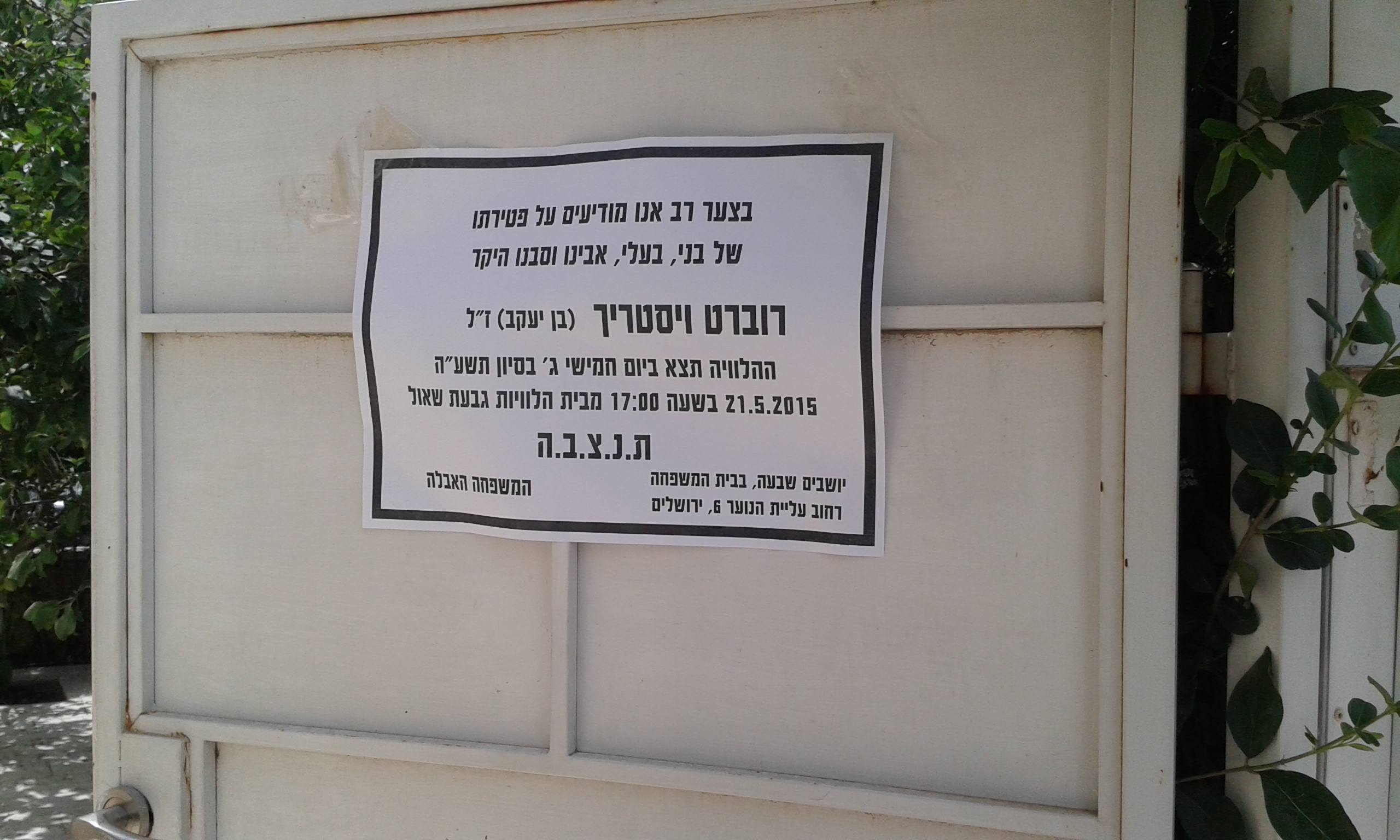
Bekanntmachung des Todes von Prof. Robert S. Wistrich an seiner Haustüre in Jerusalem
May your memory be a blessing, dear Robert Solomon Wistrich, z‘‘l.
Von Dr. phil. Clemens Heni, Direktor, The Berlin International Center for the Study of Antisemitism (BICSA)











